| Srl | Item |
| 1 |
ID:
140961
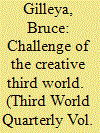

|
|
|
|
|
| Summary/Abstract |
This article is a contribution to recent literature on the shape of the polycentric world order. It argues that the Third World remains a valid concept for describing the interests and ideas that shape the foreign policies of many key non-Western states. However, the Third World has changed in a fundamental way. The article describes the historical emergence and contemporary manifestations of a ‘creative’ Third World in contrast to the ‘protest’ Third World of the past. It describes the nature of this shift and how it is reshaping Western leadership. It argues that the main challenge for the West is to create a coherent pluralism in international order that embraces this creative Third World.
|
|
|
|
|
|
|
|
|
|
|
|
|
|
|
|
| 2 |
ID:
160831
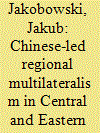

|
|
|
|
|
| Summary/Abstract |
This article examines the network of Chinese-led regional platforms, established throughout the developing world in the twenty-first century. It seeks to identify the common features of Chinese-led regional multilateralism: its normative basis, institutionalization patterns and the scope of cooperation. A comparative study of three selected platforms established in Central and Eastern Europe (16 + 1), Africa (FOCAC), and Latin America (CCF) is provided. These comprehensive dialogue mechanisms are based on Chinese-backed norms of non-binding agreements, voluntarism and consensus, derived from the tradition of South–South cooperation. This translates into a flexible and loose institutional structure that enables China to combine multilateral and bilateral approaches, creating a highly adaptable blueprint for managing foreign relations on a regional scale. The article evaluates the outcomes of the Chinese-led regional model and discusses the implications of the findings for the understanding of China’s evolving foreign policy.
|
|
|
|
|
|
|
|
|
|
|
|
|
|
|
|
| 3 |
ID:
167052
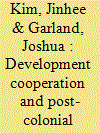

|
|
|
|
|
| Summary/Abstract |
With the rise of the South–South Development Cooperation (SSDC), the international development community has entered into a new paradigm of development cooperation. The Organisation for Economic Co-operation and Development – Development Assistance Committee (OECD-DAC) has had to consider what recently added members might have to offer, particularly South Korea given its dramatic transformation from official development assistance (ODA) recipient to donor. Post-colonial theory sees ODA as a system that reinforces the traditional hierarchy of North–South relations and reaffirms the hegemony of dominant countries; the SSDC has faced similar neo-colonial allegations. By employing post-colonial theory this paper investigates some neo-colonial criticisms of the ODA activities of major OECD-DAC and SSDC providers, before turning its focus on those of South Korea to determine whether it does indeed offer an alternative strategy to development. The African region was chosen as the focus in light of the increased amount of aid South Korea has allocated to the region. This paper concludes by offering a different role South Korea might play engaging within the OECD-DAC/SSDC context.
|
|
|
|
|
|
|
|
|
|
|
|
|
|
|
|
| 4 |
ID:
135043
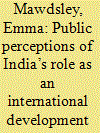

|
|
|
|
|
| Summary/Abstract |
The literature on South–South Development Cooperation (ssdc) has grown exponentially in the past few years. One focus of analysis has been how domestic institutions and agendas shape the approaches to development cooperation of different Southern partners. However, few analysts to date have commented on how the ‘ordinary’ general public of these countries might perceive or assess their country’s role in international development. Through a study based on interviews and media analysis, this paper attempts to tease out the slim evidence currently available on ‘public’ attitudes in India, concentrating, for reasons explained, exclusively on elites and ‘middle classes’. It argues that, while some domestic criticism will certainly accompany the growing visibility of Indian development cooperation, the attractive blend of discursive positioning and material benefits may provide the Indian government with broad support for its growing investment and profile in international development, or at least offset a degree of criticism. At present there appears to be little public discussion about whether and how India’s external role relates to domestic poverty, or the nature of growth and ‘development’ that India is helping to stimulate in partner countries. The paper also discusses ‘boundary making’ with China through the public construction of Indian development cooperation.
|
|
|
|
|
|
|
|
|
|
|
|
|
|
|
|
| 5 |
ID:
121762
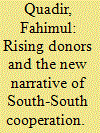

|
|
|
|
|
| Publication |
2013.
|
| Summary/Abstract |
This article aims to provide a critical analysis of how the 'emerging donors' are redefining the structure of development cooperation in the new millennium. It offers an overview of the growing role of Brazil, China, India and South Africa in shaping the conditionally driven framework of official development cooperation. By reviewing the aid coordination mechanisms of the Southern donors, the article also seeks to provide a context for comprehending the challenges for Southern countries to systematically manage, monitor and deliver aid. It argues that the Southern donors' interest in changing the dominant conditionality driven narrative of aid has opened up the possibility for constructing a new aid paradigm that focuses more on the strategic needs of the partner countries than on advancing the ideological interests of the donor countries. However, without assuming a much greater role in providing overseas aid and without building a unified platform based on a shared development vision, Southern donors will not be able to meaningfully alter the current dac -dominated aid architecture.
|
|
|
|
|
|
|
|
|
|
|
|
|
|
|
|